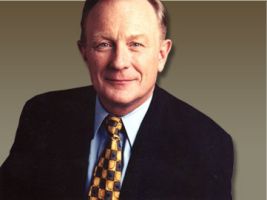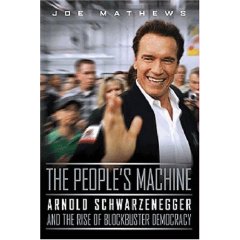TODAY’S SUNDAY COMMENTARY IS "GUEST HOSTED" BY LONGTIME FLASHREPORT FRIEND SHAWN STEEL. STEEL, A PROMINENT LOS ANGELES COUNTY ATTORNEY, IS A FORMER CHAIRMAN OF THE CALIFORNIA REPUBLICAN PARTY, AND HAS PENNED THIS BOOK REVIEW… Los Angeles Times reporter Joe Mathews’ new book, “The People’s Machine: Arnold and the Rise of Blockbuster Democracy” is quite the rage in Sacramento and for California political junkies. Mathews recounts the political formation of Arnold Schwarzenegger and the origins of the 2003 Gray Davis Recall that dethroned a sitting governor for the first time in 80 years – and elected Arnold Schwarzenegger in his place.
Los Angeles Times reporter Joe Mathews’ new book, “The People’s Machine: Arnold and the Rise of Blockbuster Democracy” is quite the rage in Sacramento and for California political junkies. Mathews recounts the political formation of Arnold Schwarzenegger and the origins of the 2003 Gray Davis Recall that dethroned a sitting governor for the first time in 80 years – and elected Arnold Schwarzenegger in his place.
That time now seems like eons ago, but we should remember the California Republican Party was on its back following the November 2002 election disaster in which all but one statewide GOP candidate went down to defeat. The Party had reached a nadir. Much of the organized big business community had deserted to Gray Davis, with the state Chamber of Commerce and the Business Roundtable served as affable allies against Republicans, and particularly Bill Simon.
Then, just days after being re-elected, Davis admitted he misstated the size state deficit by billions of dollars and the chattering classes in Sacramento began chattering about major tax increases.
I was California Republican Party chairman at the time and was at a conservative networking meeting in Sacramento the December following the election. Ted Costa approached me with his idea for recalling Gray Davis.
I thought the idea was absurd.
Soon afterward, I was a guest on Melanie Morgan’s talk radio program on KSFO in San Francisco and she pressed me for an alternative to four more years of Gray Davis. I blurted out there was “talk of a recall” – a n idea Morgan loudly and immediately embraced. I carefully explained I was unfamiliar with the legal, timing and practical aspects of a gubernatorial recall but would report back to her listeners. But when “Fred from Petaluma” phoned in to the show that he would drive to downtown San Francisco and pick up 50 petitions, I could sense a voter volcano was erupting.
Immediately after appearing on Morgan’s show, Bob Johnson asked me to come on his Voice of the Valley radio show in the north San Joaquin Valley to discuss this recall idea. The prairie fire was starting.
In theory, qualifying a gubernatorial recall would be a breeze. We only needed signatures equaling 5% of the combined gubernatorial vote from in the last election – when the turnout was historically low. And we had 5 months in which to do it.
To our dismay, most of the California Republican leadership was cool to the idea – to put it mildly. Gerry Parsky, President Bush’s man in California was hostile to the recall until almost the very end. These GOP leaders feared the recall would fail and embarrass the party – to which I responded the state GOP was already embarrassed and had nothing to lose because Republican legislative leaders were leading an army of invalids with no power in Sacramento.
Fortunately, the recall was not dependent on the state party leadership, and unified conservative grass-roots support pushed the California Republican Party executive committee and convention to endorse the recall in February 2003 — notwithstanding the formal opposition from our national committeeman, Gerry Parsky and GOP legislative leaders.
During the next six months, I was busier than I ever dreamed I would be as an outgoing party chairman, working the talk radio circuit and plumping the recall. A true boon to our efforts was the fact that recall petitions could be downloaded from the Internet. For the first time in history, a public official could be recalled via the Internet. Moreover, support from dozens of conservative talk radio hosts around the state meant we were in virtually daily communication with more than 2,000,000 conservatives. The fusion of these two mediums produced more than 100,000 signatures in the first 30 days.  “The People’s Machine” author Joe Mathews did his homework, interviewing hundreds of key players in this first-of-its-kind political earthquake. I can vouch for the accuracy of Mathew’s description of events to which I was a party or of which I knowledge, which leads me that accuracy extends throughout the book.
“The People’s Machine” author Joe Mathews did his homework, interviewing hundreds of key players in this first-of-its-kind political earthquake. I can vouch for the accuracy of Mathew’s description of events to which I was a party or of which I knowledge, which leads me that accuracy extends throughout the book.
Readers of this column will know many of the individuals Mathews writes about. Readers will be surprised to learn what prompted Darrell Issa to fund the signatures — and what events led to Arnold’s declaration of candidacy when he was still sporting the Terminator haircut.
The ripples of the Arnold phenomenon continue to roil California’s political waters. Mathews’ book traces Schwarzenegger’s political formation and entry into national and state politics, his victory in the 2003 recall victory, his early dealings and successes with the legislature through the mashing Arnold received from the $164,000,000 media barrage against him and his 2005 “Year Of Reform” initiatives.
It’s clear from Mathews’ book that even a savvy player like Arnold didn’t understand the naked power of unlimited union spending, and the Mathews explains why Arnold plunged more than $ 7,000,000 of his own money into an ultimately failed effort to pass his raft of reform initiatives. I’ve e never seen any Governor work so hard for a losing cause.
Now Arnold is back. Eviscerating Angiledes, co-opting Republicans and Democrats, business and labor, Indians and Labor, Latinos from mainstream democrats, Arnold always needs to be the center of attention. He doesn’t like predictability. Joe Mathews understands this better than anyone. The People Machine’s is destined to be the classic definer of the Age of Arnold.
_____________________________________________________________
You can reach Shawn Steel, via the FR, here.
You can order a copy of Joe Mathews’ book via Amazon right here.
Care to read comments, or make your own about today’s Daily Commentary?
Just click here to go to the FR Weblog, where this Commentary has its own blog post, and where you can read and make comments.

